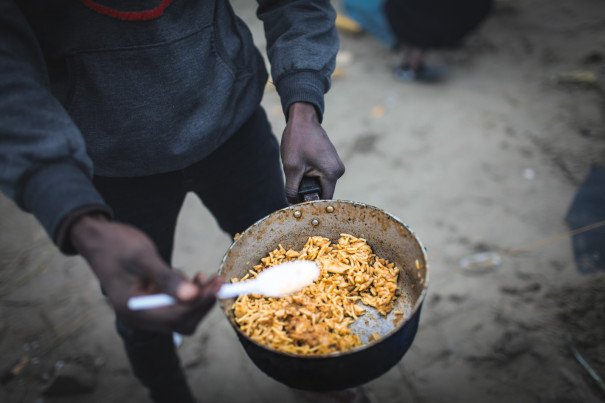
Some of the Many Breakfasts Consumed in a French Refugee Camp

Some of the Many Breakfasts Consumed in a French Refugee Camp
Chai in Calais
In the cafés and restaurants of the Calais refugee camp commonly known as “the Jungle,” run mostly by Afghans and Pakistanis, paratha and chai rule the morning. Diners sit expectantly on the carpeted platforms that run the edge of the room, shoes removed and mobile phones plugged in to charge, as rolled, layered, and stretched discs of greased dough emerge from the kitchen, golden, flaky, and delicious. Consumed with an enthusiasm that led me to burn my tongue without regret, the weight of the paratha is lightened by a tinglingly sweet milk tea, served so hot that the thin white plastic cup that holds it feels as though it may give way at any moment. Elsewhere, small cooking fires breathe black whispers of smoke into the air as one-pot meals—often of white beans and tuna with tomato—are scooped out of the pan with shards of bread and shared between neighbors among the thicket of tents.
This is, for sure, just a slice of the many breakfasts consumed in the Jungle. There are five main nationalities in the camp, and while there’s plenty of mingling, the aforementioned cafes are visited mostly by Afghan, Iraqi, and Syrian refugees. And this slice is selective, too: I’m an outsider here—both a volunteer and photographer—and so this is what I can see. But from that sample, breakfast in the Jungle seems much like any other breakfast.
But is it? One morning, as I went to take a photograph of a sign proudly proclaiming the black identity of its author, a young Sudanese man clambered from a tent, a pan of spaghetti in his hand. His was a breakfast at the end rather than the beginning of the day — it had come after a long night spent quite literally risking life and limb trying to “jump” the EuroTunnel trains to the United Kingdom. In the later hours of the night, a slow exodus of men retrace the four-mile walk to the tunnel. Most will return at dawn, carrying the frustration of another dangerous, tiring, and fruitless night. He does this five nights a week, he tells me.
More recently, others woke to new surroundings after a fire swept away the already shallow roots of more than 150 people. Yet again displaced, breakfast came alongside refuge in the volunteer-run Good Chance Theatre and Ashram Kitchen. While suggestions that this was a reprisal in the wake of the Paris attacks circulated on Twitter (it was in fact a candle), some of those in the Jungle—many of whom are the first victims of that very same enemy—feared they may yet again bear the brunt of a fanatical backlash, and that the door onwards to Britain was surely now not only closed, but irreversibly bolted shut.
I head into one of the newer cafés with another volunteer. Behind the counter, Bilal presides over a selection of trays—spinach, chicken, chickpeas—and a pot of steaming, sweet chai on the stove. Originally from Pakistan, he has been in the Jungle for two years now and hopes, like so many others, to reach Britain, where much of his family lives. Simple conversations like this often give way to unspoken pangs of emotion, and as he reaches over to grip my shoulder, this is no exception. It’s the sort of emotional moment that needs no words, and while you grow used to them, they do not become less effecting. After a second cup of tea, I push a euro into his hand—he had insisted the first one was on the house. “One day I’ll reach the U.K., inshallah” he says, with his palm held against his chest.
The names in this article have been changed.